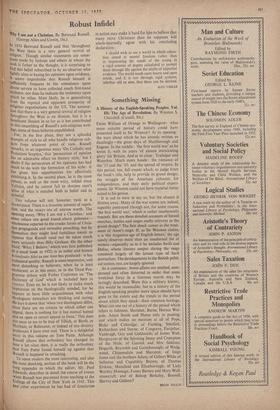Robust Infidel
Why ant not a Christian. By Bertrand Russell. (George Allen and Unwin, 16s.) IN 1954 Bertrand Russell said that 'throughout the West there is a very general revival of religion. Though similar statements are some- times .made by bishops and others in whom the wish is father to the thought, it is surprising to fi.nd this belief subscribed to by an observer who rightly aims at basing his opinions upon evidence, h seems improbable that Russell himself is sUfficiently frequent in his attendance upon divine service to have collected much first-hand evidence, nor does he indicate the testimony upon which he relies. Most likely, he is generalising from the reputed and apparent prosperity of religious organisations in the US. The assump- tion that there is a very general revival of religion throughout the West is an illusion, but it is a beneficent illusion in so far as it has contributed to this assembling of Russell's anti-religious writ- ings, some of them hitherto unpublished.
For, in the first place, they are a splendid example of style to all who handle religious sub- jects from whatever point of view. Russell remarks, in an ingenious essay 'On Catholic and Protestant Sceptics,' that 'persecution of opinion has an admirable effect on literary style,' but I doubt if the persecution of his opinions has had Much to do with the formation of his style : it has given him opportunities for effectively exhibiting it. In the second place, he is the most robust, as well as the most witty, infidel since Voltaire, and he cannot fail to sharpen men's sense of what is entailed both in belief and in unbelief.
This volume will not, however, rank as a Masterpiece. There is a tiresome amount of repeti- tion, and the essays are of uneven worth. The oPening essay, 'Why I am not a Christian,' and some others 'are good knock-about polemics— Wholesome repartee to the cruder forms of Chris- tian propaganda and revivalist preaching, but by themselves they might lead fastidious minds to suPpose that Russell need not be taken much More seriously than Billy Graham. On the other hand, 'What I Believe,' which was first published as a small book in 1925; is as noble and honest a con fe.s.sio fidei as our time has produced: it has a classical quality. Russell is most impressive, and Most disturbing to believers, when he is least exuberant, as in this essay, or in the Third Pro- gramme debate with Father Copleston on 'The Existence of God' which is included here in c.xtenso. Even so, he is not likely to make much impression on the theologically minded, for he appears to have little acquaintance with what theologians nowadays are thinking and saying. lie lays it down that 'when two theologians differ, since there are no criteria to which either can appeal, there is nothing for it but mutual hatred and an open or covert appeal to force.' This does not seem to me to be true of Tillich, or Barth, or Maritain, or Bultmann, or indeed of any divinity Professors I ,have ever met. There is a delightful essay in this volume on Tom Paine. Although Russell allows that orthodoxy has changed its tune a lot since then, it is really the orthodoxy that Tom Paine found himself up against that Russell is happiest'in attacking. To some readers the most interesting, and also the most shocking, section of the book will be the Long appendix in which the editor, Mr. Paul Edwards, describes in detail the course of events When Russell was prevented from teaching at the College of the City of New York in 1941. This and other experiences he has had of fanaticism
in action may make it hard for him to believe that many more Christians than he supposes will whole-heartedly agree with his concluding declaration :
1 should wish to see a world in which educa- tion aimed at mental freedom rather than at imprisoning the minds of the young in a rigid armour of dogma calculated to protect them through life against the shafts of impartial evidence. The world needs open hearts and open minds, and it is not through rigid systems, whether old or new, that these can be derived.
ALEC VIDLER


































 Previous page
Previous page